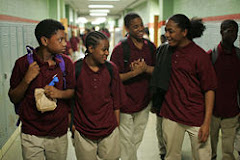Part III of the IB English Higher Level course - which we complete during the second semester of Senior year - is a Genre study. I must choose four texts, all linked by genre and theme, from a list; however, one of the texts may be a 'World Literature' text not on a list, that also links with genre and theme with the other three texts.
I was excited that the author of
The Big Sleep as on the list. Raymond Carver, or so I thought. I was all ready to teach the book, which I think the students would have really enjoyed - a private eye story written in the 1930s, dripping in noir and about the seedy underbelly of Los Angeles. I loved the book when I read it a few weeks ago and thought the kids would, too. I was even thinking about what theme I could use to link it together with other texts, and was thinking about the corrupting force of money, which I could also link with Morrison's
Song of Solomon.
But
The Big Sleep is by Raymond Chandler, not Raymond Carver. I had them confused. I just found out last night.
However, I'm still interested in this idea of the gap between the poor and the rich, and exploring that idea through literature. I'm reading
The White Tiger by Aravind Adiga right now, and it's this angry, railing text by a lower-class Indian kid written in the form of seven letters to the Prime Minister of China. It's fresh, funny, and a page turner, and I think the students would be into it. That would by my 'World Lit' text, as it's not on the list but comes from another country.
That book has been described as another
Native Son, so I'm going to read that one next. A former student has told me it's a life changer, and the 10th grade teacher was very successful in teaching it this year, so I'm thinking about that one, too. From the descriptions, it seems that's a book about the gap between the haves and the have-nots, too, filtered through American racism. And, like
The White Tiger, the protagonist is a charismatic murdered driven to the deeds by society - at least a bit. Or so it seems. (I haven't read it yet.)
So, if I'm doing this theme (We could call it "The Repercussions of the Gap Between the Rich and the Poor"), I have to find two more texts. Preferably by women, although I could put more women in the other section of the course if it's impossible. I'm pretty disappointed by the IB list, which hasn't been updated in over ten years and is pretty sparse on women.
However, here is the list from which I can choose. Anything jumping out at you as being about the Rich/Poor gap? I'm thinking about Atwood's
Oryx and Crake (which I haven't read, but the description seems to fit... I'll read it next). A lot of the authors I'm unfamiliar with, and many have are pretty much unavailable (Bessie Head, for example, all her books are out of print... I find this is the case with many.)
I try to give the kids a wide experience, so I'm trying to do less Americans. However, I wouldn't mind doing something they'd love, or doing something that is from a culture that they're not that familiar with (for example, I'd love it if one of Louise Erdrich's novels fits, though I don't think they do...).
I'm teaching Morrison's
Song of Solomon, and could squeeze it into this theme, but prefer to put that in the other part of the course. The other part of the course is one-from-each-genre: a Shakespeare, a novel, a non-fiction text, and a poetry collection. I have lots of ideas there, but the list is more limited than the one I present below.
Anyhow, I'd love any recommendations of any texts from any of these authors that you might think fit this rich/poor theme. Both
The White Tiger and
Native Son are also very angry in tone, so that's another possible connection I could make between texts.
Africa: Ama Ata Aidoo, Cyprian Ekwensi, Bessie Head, Chenjerai Hove, Kojo Laing, Dominic Mulaisho, Charles Mungoshi, Isidore Okpewho, Ben Okri, Chinua Achebe, Ayi Kwei Armah, Andrew Brink, Buchi Emecheta, Nadine Gordimer, Ngugi wa Thiong'o.
Asia: Amitav Ghosh, Ruth Prawer Jhabvala, Arundhati Roy, Vikram Seth, Mulk Raj Anand, Anita Desai, R.K. Narayan, Salman Rushdie.
Caribbean: George Lamming, Richard Lovelace, V.S. Naipaul, Ama Brodber, David Dabydeen, Caryl Phillips, Jean Rhys.
Europe: Auste, Bronte (both), Conrad, Defoe, Dickens, Eliot, Fielding, Forster, Hardy, Joyce, Lawrence, William Trevor, Woolf, Kingsley Amis, Iain Banks, Julian Barnes, A.S. Byatt, Angela Carter, Roddy Doyle, Margaret Drabble, Graham Green, Ishiguro Kazuo, Kipling, Lessing, Murdoch, Orwell, V.S. Pritchett, Evelyn Waugh.
North America: Atwood, Auster, Bellow, Davies, Faulkner, Findley, Fitzgerald, Hawthorne, Hemingway, James, Margaret Laurence, Anne Michaels, Morrison, Munro, Poe, Steinbeck, Twain, Wharton, Wright, Carver, Cisneros, Chopin, Erdrich, Hurston, Kinkaid, Alistair Macleod, Melville, Rohinton Mistry, Flanner O'Connor, Carol Sheilds, Silko, Twain, Alice Walker, James Welch, Eudora Welty.
Oceania: Janet Frame, David Malouf, Christina Stead, Patrick White, Tim Winton, Peter Carey, Janette Hospial, Henry Lawson, Katherine Mansfield, Olga Masters, Randolph Stow, Albert Wendt.

